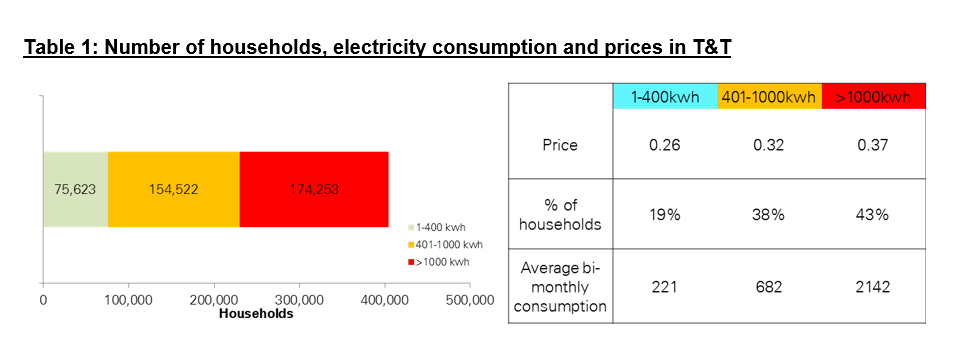The Energy Chamber has recently done significant work in analyzing the electricity subsidy through the Energy Efficiency and Alternative Energy Committee. We've begun showing how it works, the opportunity cost it creates for gas sales and the role that renewables and energy efficiency can have in reducing government expenditure on the electricity subsidy.
We've also paid particular attention how electricity is generated in Trinidad and Tobago and we found that significant improvements in the efficiency of our power generation assets can create increased government revenue and foreign exchange. This is relevant in the context of renewable energy as well. It is unwise to put a solar panel on an inefficient house and it is just as unwise to put a solar farm on an inefficient country. So what is the level of electricity consumption in T&T’s households? To answer that question we have to get an understanding of how we categorize and pay for electricity in Trinidad and Tobago.
Consumption and Price Categories
Residential electricity consumption is priced based on the amount of energy used by a household on a bi-monthly basis. The 3 usage categories are as follows:
1. 1-400kwh
2. 401-1000kwh
3. >1000kwh
Numerous studies have shown that subsidies lead to wasteful behaviors and T&T is no different. Despite having 3 consumption categories at various prices, roughly 43% of all households in the country fell in the highest usage category of >1000kwh. In addition the average bi-monthly consumption of these households in 2015 was roughly 2100kwh (See Table 1). Comparing this level of consumption to other regions highlights a startling reality; 43% of homes in T&T have a consumption level that is on par with the average North American home, twice that of the average European home and 3 times the global average. Moreover, 70% of all residential power in Trinidad and Tobago is consumed by this 43% which to some extent illustrates the level of income inequality in the country.
Why is Consumption in T&T so high
There are approximately 400,000 households in T&T putting the average number of persons per household at ~3 persons per home. While the average North American household is slightly smaller at ~2.6 persons per household there is still a large gap between both the standard of living and income levels between T&T and North America. Taking these factors into consideration it is clear that the reason for the high levels of consumption in T&T comes down to the choices we make. Over the last 15 years, during what some now term the ‘gas boom’, the standard of living and levels of income in Trinidad improved greatly and so did our electricity consumption. However, for many of us the decision to purchase new A/C units, clothes dryers, water heaters, dish washers and appliances may have been done in the absence of energy efficiency considerations. More importantly, low electricity prices result in the population giving less critical thought to overall energy consumption , regardless of whether or not appliances are energy efficient.
How can you get a measure of where your electricity consumption falls?
Using Table 2 you can determine how your electricity consumption compares to the average North American household. The table has been normalized to account for the small difference in the number of persons per household between North America and T&T. Therefore, if you pay more than $900.00 TTD for electricity on a bi-monthly basis you are using more electricity than the average North American household and you are part of the 43%. If you are therefore paying more than $1900.00 TTD you are using more than twice the amount of electricity as the average North American household (See Table 2).
Curbing our consumption
The government has illustrated in the budget that Trinidad and Tobago is being faced with tougher economic times. It has been stated many times that the energy resources of Trinidad and Tobago belong to the people and are the lifeblood of the economy. Taking ownership of our energy resources means that each of us must play our part and take a closer look at how we manage the use of these resources in our daily lives. As we learned from previous installments in this series, reductions in demand for electricity present an opportunity to increase government revenues by further reducing the power sector’s consumption of natural gas and increasing the export of gas based commodities. Therefore those of us who live in households that are part of the 43% must consider that reductions in our energy consumption do have a knock on impact on the wider economy. Similarly, the government needs to lead by example and ensure that government offices use less as well. In addition, the government has to create the enabling environment to allow citizens to easily purchase energy efficient appliances through Duty and VAT exemptions on the import of these critical items.
Over the past few installments we have thoroughly examined where we stand with respect to subsidies and energy efficiency. Next we will be taking an in depth look at renewable energy and how the economics stack up in the Trinidad and Tobago context.























